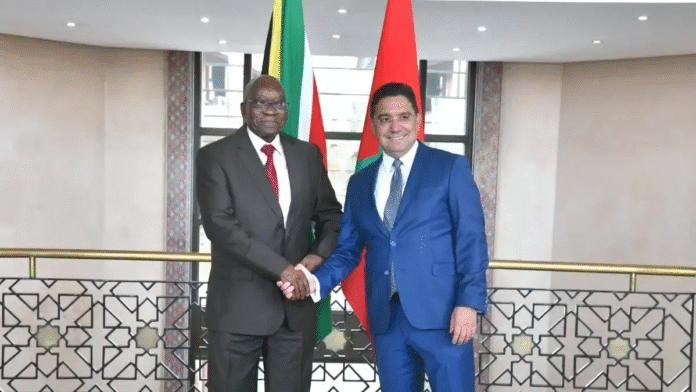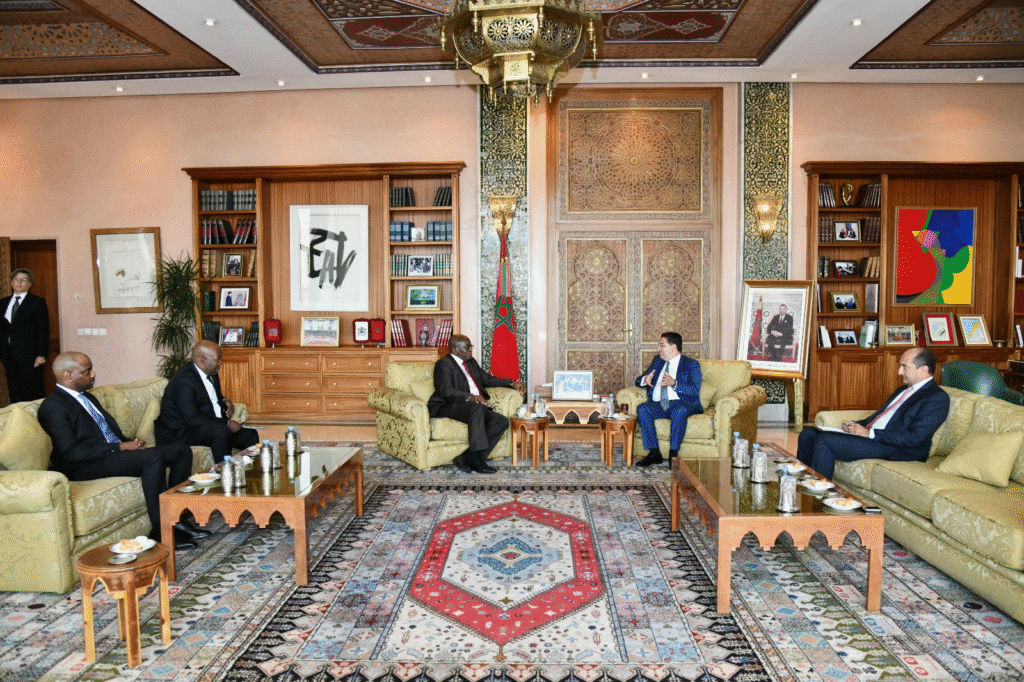
South Africa is soon closing ranks with respect to her position on the Moroccan Sahara after President Jacob Zuma’s party Umkhonto Wesizwe (MK) offered full support of Morocco sovereignty over Sahara.
President Zuma and Moroccan Minister for Foreign Affairs Naser Bourita met in Rabat where he pledged his party position.
Mr. Zuma reiterated that Morocco’s efforts to reclaim its full territorial integrity align with the MK Party’s commitment to preserving the sovereignty and unity of African states.
He noted that both countries support multipolar diplomacy and reform of international institutions to reflect African voices and both countries share concerns over destabilization caused by separatist agendas supported by external actors aimed at weakening our continent.
First, he explained the historical context terming it, critical.
“Western Sahara was a part of Morocco before Spanish colonization in the late 19th century. Indeed, Western Sahara has been an integral part of Morocco for centuries. The Moroccan claim predates colonization and is rooted in tribal allegiance to the Moroccan throne,” he noted.
President Zuma took the historic path further narrating that when Spain withdrew in 1975, the region’s status was left unresolved, and Morocco moved to reclaim it. This action, he said, was in line with Morocco’s territorial integrity, which has been a cornerstone of its foreign policy.
“Our party recognizes the historical and legal context that underpins Morocco’s claim to Western Sahara. The region has long been a part of Morocco, both before and after the colonial occupation of the Spanish, and Morocco’s sovereignty over it should be respected,” he emphasized.
He called on the international community to take into account the region’s historical ties to Morocco and the legitimate interests of the Moroccan people in maintaining their territorial integrity.
The 1975 Green March was a peaceful and powerful act of decolonization. Over 350,000 unarmed Moroccans entered the Sahara to reclaim their land — a unique, non-violent liberation movement supported by historical precedent and international diplomacy even among African countries.

Thus, the President noted that the Autonomy Initiative as the only solution to the Sahara question.
Morocco’s proposal for autonomy in Western Sahara must be looked into within the context of the unification of African people and the principles of self-determination.
Morocco’s proposal allows for significant local governance by the Sahrawi people, while ensuring over the region. This approach could offer a balanced path forward that promotes stability, peace, and development in a region long plagued by conflict.
Furthermore, the Umkhonto Wesizwe Party, firmly, believes that any solution must take into account the interests of all parties involved, including Morocco and the Sahrawi population. In this regard, the autonomy plan could possibly be a realistic alternative and a means to end the suffering and instability in this region.
“The continued pursuit of a negotiated settlement, under Morocco’s sovereignty, is reasonably the path toward peace and reconciliation in Western Sahara,” said President Zuma.
In conclusion, he called on the international community to consider Morocco’s sovereignty proposal over Western Sahara and to support this initiative as a possible effective way to ensure peace, stability, and prosperity for the people of Western Sahara.
“We call on the people of Africa to support all efforts to bring an end to this long-standing dispute, and we urge a fair and just resolution that honors the rights and aspirations of the Sahrawi people within the framework of Morocco’s territorial integrity,” he pleaded.
During the meeting Mr. Bourita and Presidnet Zuma agreed that the two countries would bolster Diplomatic Cooperation between them and that they would establish bilateral dialogue frameworks to promote common positions at the United Nations and the African Union.
On the Economic Development front the Umkhonto Wesizwe Party agreed to Support joint ventures in infrastructure, industry, energy, agriculture, Tourism and digital transformation across the continent and sign a Free trade Agreement between South Africa and Morocco.
This position by President Zuma’s party is a radical shift in the position South Africa has taken over the Sahara question and marks a new dawn of continent’s full support to Morocco’s sovereignty over Sahara.






